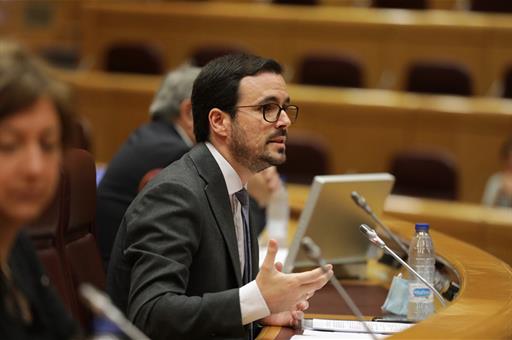Appearance in Upper House
Ministry of Consumer Affairs to launch the Nutri-score food labelling system in first four months of 2021
News - 2020.6.26
At his appearance before the Upper House of Parliament, Alberto Garzón explained that the front-of-pack labelling system is voluntary for the companies that decide to introduce it, as no European law has yet been passed making it mandatory. The decision to implement it in Spain would mean that the country will form part of the group including France and Germany, which is playing a leading role in Europe favouring the establishment of a system that is binding and accessible for everyone.
According to Alberto Garzón, this labelling system was chosen because it has most support from scientists who are experts in nutrition and consumer associations, as well as being more intuitive for consumers. A substantial part of the food industry has already announced its decision to use it.
Alberto Garzón recalled that none of the labelling systems in place is perfect, but so far Nutri-score is the one that has generated the greatest level of consensus.
Moreover, introducing the Nutri-score system means forming part of its committees and working groups, and thus having the opportunity to improve the system and adapt it to the virtues of the Mediterranean diet and craft food products.
The implementation of Nutri-score will be accompanied by consumer information and education campaigns. It will also serve as a criterion when developing policies on advertising and taxation, forming part of a comprehensive strategy to improve the nutritional quality of food.
Alberto Garzón went on to announce he was in favour of launching awareness campaigns, promoting education on healthy eating habits and measures to counter obesity.
PAOS code
Alberto Garzón also announced that the Ministry of Consumer Affairs will also carry out an in-depth reinforcement of the PAOS code, a system of voluntary control by companies to regulate the advertising of foods targeted at children under the age of 12.
"There is a clear consensus among experts and specialists in nutrition about the fact that the system is not working correctly," he explained. "Advertising of food for children is barely controlled."
Currently, the Spanish Food Safety and Nutritional Agency (Spanish acronym: AESAN) is working on a proposed new code which is more in line with the objective of regulating advertising actually seen by children.
The main new point in the reform is increasing the age range: So far, the protection was established for children under the age of 12, but the aim is to raise this age to 15 and ban advertising of food that scores a red code on Nutri-score. The ban on celebrities and cartoon characters being involved in the advertising of such products on TV or the cinema is also being tightened.
The Law 17/2011 on Food Safety and Nutrition, which created this system of voluntary control, establishes that the measures regulating advertising should be agreed voluntarily by the food industry. The work to improve the PAOS code must therefore be the result of a consensus with the sector, as has been the case in recent months.
Nevertheless, in order to guarantee protection for children and young people, article 46 of Law 17/2011 also allows the Government to establish by law the rules regulating these commercial communications and the means to make them effective, if there is no agreement on voluntary regulation of the code of conduct.
In his speech before the Upper House of Parliament, Alberto Garzón noted that "the ministry would like everything to be decided by agreement". However, if no agreements can be reached, the ministry will exercise its powers to guarantee that the food advertised for children complies with criteria of nutritional quality.
Non official translation





